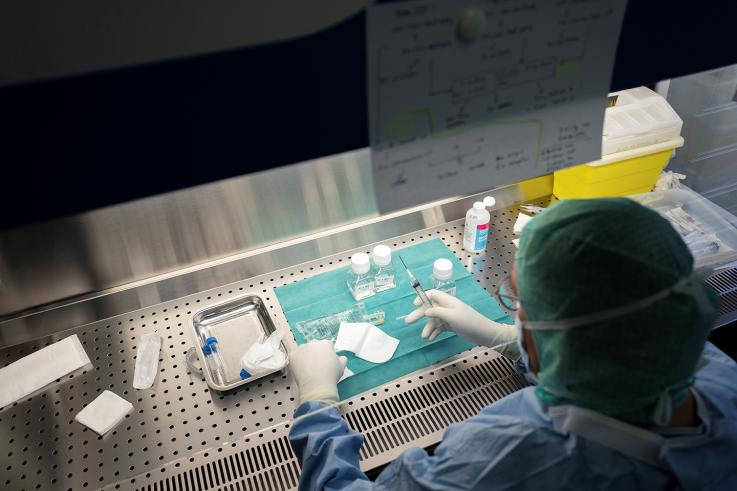ImmuCell, a biotech company in Portland, Maine, has developed a bacteriocin that treats dairy cows for mastitis, a disease that costs the dairy industry $2 billion a year. Riley says labs like hers can adapt phages and bacteriocins to target virtually any sort of human microbial infection too, with little risk of nurturing new resistance. “These are stable, hardy killing mechanisms that evolved 2 billion years ago,” she says.
緬因州波特蘭市的生物技術公司ImmuCell開發(fā)了一種細菌素,用于治療乳腺炎,乳腺炎每年給乳制品行業(yè)帶來20億美元的損失。萊利表示,像她這樣的實驗室可以讓噬菌體和細菌素適應幾乎任何一種人類微生物感染,幾乎沒有培育新的耐藥性的風險。“這些是20億年前進化而來的穩(wěn)定、頑強的殺戮機制,”她說。
Several clinical trials of phage therapy have already been successfully conducted in Poland, the nation of Georgia and Bangladesh. In the West, there have been successful phage trials for foot ulcers. No trials are underway for more serious infections, but a successful phage treatment of a critically multiresistant-infected patient in California in 2017 under Food and Drug Administration emergency rules has more researchers in the U.S. looking to develop phage treatments. One or more of these could move toward trials in the next few years, says Riley, including one for multi-resistant tuberculosis and another for pulmonary infections in cystic fibrosis patients. Bacteriocins are further behind. The U.S. government has promised to provide $2 billion for the effort to develop these alternatives, “but that's not nearly enough,” she says.
波蘭、格魯吉亞和孟加拉國已經成功地進行了若干噬菌體治療的臨床試驗。在西方,已經有成功的噬菌體試驗治療足潰瘍。目前還沒有針對更嚴重感染的試驗,但根據美國食品和藥物管理局的緊急規(guī)定,2017年加州一名多重耐藥性感染患者的噬菌體治療取得成功,這讓美國有更多研究人員希望開發(fā)噬菌體治療方法。賴利說,其中一種或多種藥物有望在未來幾年進入臨床試驗階段,其中一種用于治療耐多藥結核病,另一種用于治療囊性纖維化患者的肺部感染。細菌素遠遠落后。美國政府承諾提供20億美元用于開發(fā)替代能源,“但這還遠遠不夠,”她說。

Cancer researchers are widely investigating drugs that can boost immune systems, and these immunotherapies could be promising in helping weakened patients fight off resistant bugs that try to take hold. Researchers have produced human antibodies in cows and other animals that can be injected into patients. Boston's Harvard-affiliated Brigham and Women's Hospital, in an emergency effort, reported injecting a combination of antibodies and antibiotics to save a patient with a drug-resistant infection, but the results weren't disclosed. Otherwise, little has been done to bring the approach to trials in infected patients. Researchers are also working on vaccines against resistant staph infections and other resistant bacteria, but these too are just research efforts. “These non-antibiotic treatments are still in the early stages of investigation,” says David Banach, who heads infection prevention at the UConn Health medical center in Farmington, Connecticut. “But we have to keep thinking of new approaches.”
癌癥研究人員正在廣泛研究能夠增強免疫系統(tǒng)的藥物,這些免疫療法有望幫助身體虛弱的病人擊退那些試圖占據優(yōu)勢的抗藥性細菌。研究人員已經在牛和其他動物身上制造出了人類抗體,可以注射到病人體內。波士頓哈佛大學附屬的布里格姆女子醫(yī)院在緊急情況下報告說,他們注射了抗體和抗生素的混合物,以挽救一名耐藥感染患者,但沒有告知調查結果。除此之外,幾乎沒有人將這種方法應用于感染患者的試驗。研究人員還在研究針對耐藥葡萄球菌感染和其他耐藥細菌的疫苗,但這些也只是研究工作。“這些非抗生素治療仍處于研究的早期階段,” 康涅狄格州法明頓市康州大學健康醫(yī)療中心感染預防部門的負責人大衛(wèi)·巴納奇說。“但我們必須不斷思考新的方法。”
譯文由可可原創(chuàng),僅供學習交流使用,未經許可請勿轉載。












